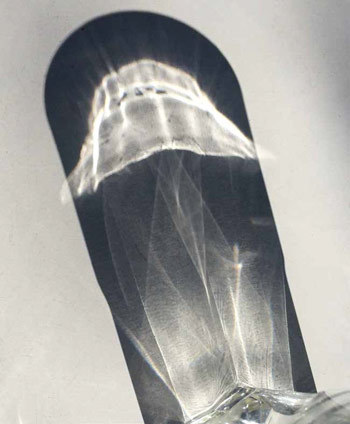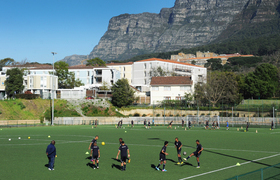Glass of water
01 December 2014
Assoc Prof Virginia MacKenny from the Michaelis School of Fine Art marvels at the wonder of things that go unnoticed – like a simple glass of water.
In 2008 I painted Freefall in response to my concern about climate change. In the vertiginous blue and the scatter of calving icebergs I placed a simple glass of water, the generic sort you might find in any home or an ordinary café. The glass of water is one of those ubiquitous objects in daily life that tend to go unnoticed. It is the one thing one can ask for at someone's gate without having to offer money.
The day I walked into the kitchen for a glass of water it was hot and I was thirsty. I selected a glass off the shelf, felt its chunky weight in my hand and turned on the tap.
Perhaps it was the shaft of sunlight that glanced off the steel of the sink and sprang through the glass making the water shine and glitter that drew my attention. Perhaps it was the double transparent clarity of both container and liquid, shot through with glintering light, which made me stop and actually see the miracle in my hand. Turning on the tap and drinking straight from the glass - directly pouring into my body the liquid which not only allows me to survive but which nourishes plants, lubricates joints, comes from the dark of the earth yet cleans and purifies – I apprehended the extraordinariness of my glass of water.
The first Greek philosopher known to us, Thales of Miletus (c.624-546 BCE), thought water was so special that it must be the basic material of the cosmos. The characteristics he saw as necessary for according water this status were threefold: its capacity of motion, its capacity to change and its indispensability to life. He also surmised that it was something from which everything can be formed (Wolter and Ritchie, 2011: 23). This last point is perhaps brought closer to home when we consider that approximately 66% of the human body is made of water (and that the human brain is 75% water).
Our intimate connection to and dependence on water is amply illustrated in the opening sequence to Sam Bozzo's film Blue Gold: World Water Wars (2008) which pulls no punches. It narrates the experience of Pablo Valencia who crossed the Sonoran Desert in Arizona in 1905 and went for 7 days without water. What happened to him, deprived of water, was horrifying: among other things, in the dehydrating process his eyes, seeking any form of liquid to lubricate them, cried tears of blood and later, when the moisture in the blood ran out, become immobilised.
Our Blue Planet, so named because its surface is largely covered in water, supplies us ironically with water that is largely undrinkable. 97% of it is salt water and, of the 2.5% or so that is fresh, less than 1% is unpolluted. In addition we have been draining our planet's fresh water resources so profligately that over the last 40 years or so many of the planet's mighty rivers have failed to reach the sea. The famous Yellow River for instance - the largest in China – has become so depleted by agriculture and industry along its banks that it now regularly fails to reach the sea. Over 60% of the world's wetlands have been destroyed, and in broader terms UNESCO estimates that by 2025, at least 25 African countries are expected to suffer from water shortages or water stress. Lake Chad, once the largest lake in Africa, bordered by four countries, has shrunk as much as 95%. Satellite images of it show fires burning where once there was water.
Willem Boshoff's Walking on Water (2011), a work that ponders a world with no water and nothing but the word remaining, speaks of 'ullage'; the amount of liquid lost from a container, through evaporation or leakage, or the amount a container is short of being full. The word, he tells us, is derived from the Latin 'oculus' for eye. He is concerned that people are making the planet drier, "lifeless, waterless - an eye that can't cry" (Boshoff in Dixon 2011:104). The concern is therefore that the planet, losing lubrication, may not only be rendered an eye that can't cry, but will also be immobilised.
Climate change, certainly in Africa and particularly in the Western Cape, is often associated with temperatures manifesting in extreme heat. Heat as transmuting element is, ironically, present in the very glass that holds the water. First discovered at the mouth of volcanoes where intense temperatures melted the sand, glass now holds the precious life-generating liquid. That the combination of these two wondrously translucent elements should be regarded as commonplace is extraordinary.
Today I went for a walk on the mountain. It was after days of rain, the mountainside was gushing with rivulets and streams of water. Its slopes were alive with movement and light. The sunlight passing through the leaves of plants intensified their green and enlivened the orange of Disas sprinkling their way across the foothills. Leaning across a little spruit I cupped my hands to drink, and gathered the water to my mouth. Springing straight from the mountain it tasted earthy, clean and life-giving.
Now every time I have a glass of water I appreciate its quotidian miracle. So it is that sometimes the simplest things become marvellous.
- The Yellow River failed to reach the sea for the first time in history in 1972. Seven other world rivers also no longer achieve their original destination each year: the Colorado in US, the Indus in Pakistan, the Syr Darya River in Central Asia, the Rio Grande in North America (which failed to reach the Gulf of Mexico in the early 2000s), the Amu Darya River in Central Asia which no longer reaches the Aral Sea, the Teesta River in India and the Murray in Australia. (National Geographic, 2014)
- Some recovery of Lake Chad's levels was noted in satellite images of 2007.
Read other essays in Stephen Inggs' Object Relations collection - about Virgina MacKenny contemplating the significance of a glass of water, Mark Solms' last letter from his father, Andy Buffler's plastic scintillator (which glows when exposed to radiation), what a tennis racket means to Hedley Twidle, or Nick Shepherd encountering the box in which Sarah Baartman's remains were repatriated.
 This work is licensed under a Creative Commons Attribution-NoDerivatives 4.0 International License.
This work is licensed under a Creative Commons Attribution-NoDerivatives 4.0 International License.
Please view the republishing articles page for more information.










